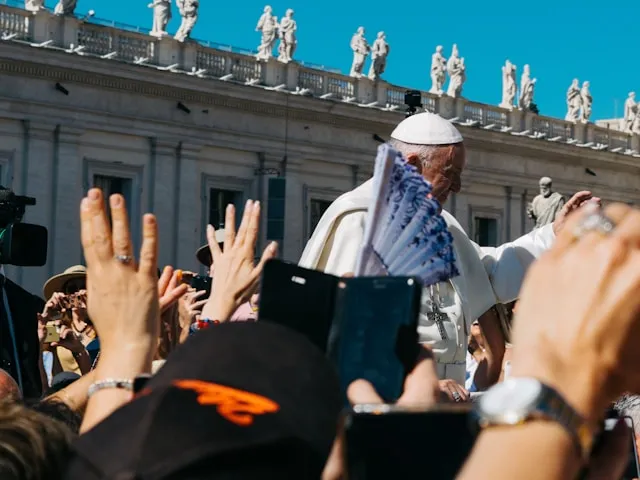VERSIÓN EN ESPAÑOL
Una de las cosas que añoro de mi tiempo de seminario es poder leer casi a diario los discursos a las embajadas, para los institutos, dicasterios y diversidad de personas y grupos que dirige el Papa desde su sede en el Vaticano, esto era algo que hacía con frecuencia, no solo porque se trata de una persona de importancia dentro de la iglesia, sino también porque el pensamiento teológico de los mismos es bastante interesante, en ellos se interrelaciona lo que es el magisterio o enseñanza de la iglesia con lo que es el desarrollo de la teología desde el comienzo de los siglos hasta nuestros tiempos actuales.
Paradójicamente, siento una empatía especial por la manera en que el Papa Francisco lleva su ministerio, me gustaría tener más tiempo disponible para ahondar las raíces teológicas que le dan sentido a la pastoral que lleva, puesto que aunque no he podido profundizar, detrás de la forma de llevar su ministerio, hay una teología que le guía, en efecto, unos meses atrás escuchaba una conferencia sobre estas líneas de pensamiento que él sigue, así como también una entrevista donde de sus mismos labios salían algunas posturas teológicas, que empalman perfectamente con sus líneas de acción pastoral y de gobierno.
En primer lugar, hay un personaje teológico que permea sus ideas, este es Romano Guardini, el cual logra armonizar en un nivel superior los contrarios, por ejemplo Gracia y libertad, acción y contemplación, fe y obras, cruz y gloria, tristeza y alegría, etc. Este es una línea teológica que siguen de hecho otros importantes teólogos de la edad contemporánea, como Von Baltasar que habla de la polaridad en el ser. Pues bien el Papa Francisco aún habiendo estudiado en su etapa académica una teología preconciliar tuvo la valentía de actualizarse en la misma y poder estar en sintonía con las propuestas hechas a los hombres y sociedad de hoy.
Esta línea de pensamiento teológico es muy actual, sobre todo en los tiempos actuales, donde se piensa que es algo o es blanco o es negro, y que no hay distinciones que puedan encontrarse sino líneas divisorias absolutas, cuando en realidad tales línea no existen porque las hemos creado los mismos seres humanos. Es por ello que el Papa Francisco dentro de su rol de guía de la Iglesia universal apuesta siempre al encuentro, al diálogo, a escucharse, puesto que nadie es dueño absoluto de la verdad, sino que el otro siempre tiene algo que decirme, y todos debemos estar abiertos a la posibilidad de encontrar algo valioso en los demás.
Una vez escuché una frase que decía que la persona realmente inteligente es la que hace que cosas complejas puedan llegar de manera sencilla a los demás, creo que sin exageración alguna esto es algo que a cabalidad cumple el Papa Francisco, ya que sabe llegar de manera simple, pero profunda a prácticamente todas las personas con un ejemplo, anécdota, ilustración, imagen, transmite ideas centrales, fundamentales y esenciales de nuestra fe. Algunas que me vienen a la mente son en la vida hay que patear el balón hacia adelante, no hay que balconear la fe, y hay que estar siempre en movimiento, es decir, hay que hacer lío.
Siento que tal vez no sé está siendo totalmente justo incluso dentro de la iglesia para valorar la profundidad teológica que tiene este papa. Claro, entiendo que hay factores que llevan a ello, como el que su predecesor, Benedicto XVI, era el teólogo más ilustre de nuestro tiempo, no obstante si es interesante tener en cuenta que la teología, es decir, la manera de comprender a Dios y la fe del actual Pontífice es también sumamente importante y, sobre todo, actual.
Es por ello que aunque alguna de sus posturas han sido criticadas, si las estudiamos más en profundidad vamos a descubrir que son totalmente acordes con las enseñanzas de Jesús en el evangelio, la más central de todas que es que Él no excluye nadie del anuncio del Reino de Dios, sino que todos son igualmente invitados al Banquete del Cordero, esta es la razón por la cual el papel de los cristianos hoy en día es hacer accesible a este Dios a todos, indiferentemente de su condición social, orientación sexual, posiciones políticas, o incluso preferencias religiosas, entre otras etiquetas que artificialmente los seres humanos hemos creado.

ENGLISH VERSION
One of the things I miss from my seminary days is being able to read almost daily the speeches to the embassies, institutes, dicasteries and a diversity of people and groups that the Pope directs from his headquarters in the Vatican, this was something I did frequently, not only because he is a person of importance within the church, but also because the theological thought of them is quite interesting, they interrelate what is the magisterium or teaching of the church with what is the development of theology from the beginning of the centuries to our present times.
Paradoxically, I feel a special empathy for the way in which Pope Francis carries out his ministry, I would like to have more time available to delve into the theological roots that give meaning to the pastoral that he carries, since although I have not been able to deepen, behind the way of carrying out his ministry, there is a theology that guides him, in fact, a few months ago I listened to a conference on these lines of thought that he follows, as well as an interview where from his own lips came out some theological positions, which fit perfectly with his lines of pastoral action and government.
In the first place, there is a theological character that permeates his ideas, this is Romano Guardini, who manages to harmonize on a higher level the opposites, for example Grace and freedom, action and contemplation, faith and works, cross and glory, sadness and joy, etc. This is a theological line followed in fact by other important theologians of the contemporary age, such as Von Balthasar who speaks of polarity in being. Pope Francis, even though he studied a preconciliar theology in his academic period, had the courage to update it and to be able to be in tune with the proposals made to the men and society of today.
This line of theological thought is very current, especially in the present times, where it is thought that something is either black or white, and that there are no distinctions that can be found but absolute dividing lines, when in reality such lines do not exist because we human beings have created them. That is why Pope Francis, in his role as guide of the universal Church, always bets on the encounter, on dialogue, on listening to each other, since no one is the absolute owner of the truth, but the other always has something to tell me, and we must all be open to the possibility of finding something valuable in others.
Once I heard a phrase that said that the really intelligent person is the one who makes complex things can reach others in a simple way, I think that without any exaggeration this is something that Pope Francis fully meets, since he knows how to reach in a simple but profound way to virtually all people with an example, anecdote, illustration, image, conveys central, fundamental and essential ideas of our faith. Some that come to my mind are: in life you have to kick the ball forward, you must not balconize your faith, and you must always be on the move, that is to say, you have to make a mess.
I feel that perhaps I am not being totally fair even within the church in assessing the theological depth of this pope. Of course, I understand that there are factors that lead to this, such as the fact that his predecessor, Benedict XVI, was the most illustrious theologian of our time, however it is interesting to keep in mind that the theology, that is, the way of understanding God and the faith of the current Pontiff is also extremely important and, above all, current.
That is why although some of his positions have been criticized, if we study them more in depth we will discover that they are totally in accordance with the teachings of Jesus in the Gospel, the most central of all which is that He does not exclude anyone from the announcement of the Kingdom of God, but that all are equally invited to the Banquet of the Lamb, this is the reason why the role of Christians today is to make this God accessible to all, regardless of their social status, sexual orientation, political positions, or even religious preferences, among other labels that we human beings have artificially created.






